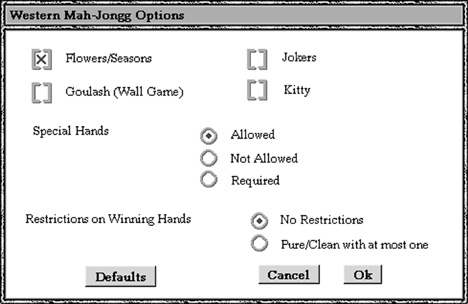
![[Contents]](/file/24033/1998-07_Disc_4.1.iso/shanghai/data/images/contents.jpg)
It should be noted that, in the United States, there are three different sets of "American" Mah-Jongg rules: National Mah-Jongg League, Wright Patterson, and common or "universal" Western rules. Since 1920 when Joseph P. Babcock introduced the game to the United States, the game has gone through quite an evolution, and has branched out into several different evolutionary branches. The National Mah-Jongg League and the Wright Patterson Air Force Base Officers' Club both publish different uniquely "American" rules for Mah-Jongg; their rules are available by mail from those associations (they are not usually available in bookstores). The rules used in Shanghai: Dynasty are instead the rules which can commonly be found in Mah-Jongg books readily available in bookstores throughout the English-speaking world. You can learn about Mah-Jongg books later in this Help file.
When you click on the Western option in the Mah-Jongg Game Setup dialog box, this dialog box will appear, giving you the different options you can select for the Western game:

If you are used to playing Mah-Jongg by NMJL or WPAFB rules, you can choose the Special Hands Required option and select Jokers to approximate the NMJL game, and Special Hands Allowed to approximate the WPAFB game.
A "blind pass" of one, two, or three tiles is permitted on the last pass of the Charleston: for example, if you have only two tiles that you want to exchange with your neighbor, then you can click those two tiles, and one of the three face-down tiles passed to you by your other neighbor. The highlighted tiles will be passed on to your exchange partner.
Melded Jokers can be redeemed on a player's turn - if an opponent has a melded Pong of East Winds, for example (and one of the tiles is a Joker), and you have an East Wind tile, then when it's your turn (after you draw but before you discard), you can highlight your East Wind tile, then click on the melded Joker, to add the Joker to your hand. Effectively, your opponent keeps his/her melded Pong and you get a wild tile to meld into something of your own later. If you redeem a Joker you may hold it in your hand until you can use it in a meld or a win.
Discarded Jokers cannot be taken - "down is dead." When a player discards a Joker (something a player might want to do towards the end of the game, when his options are limited and he wants to make sure nobody else wins), the discard is regarded as being identical to the previous discard. For example, if West discards an Eight Bam, and North then follows up by discarding a Joker, the Joker is regarded as being an Eight Bam. If East then wishes to claim the Eight Bam for a Pong, Kong, or Chow, he may take the Eight Bam (not the Joker). Jokers cannot be passed during the Charleston.
In certain cases, the computer may not recognize how you want to use a joker, especially in Chows of special hands.
For novice players, we recommend not selecting Special Hands Required nor selecting Jokers. Once you have mastered the basics of Mah-Jongg, you can graduate to the required use of special hands - we further recommend that you turn Jokers on when you go this route.